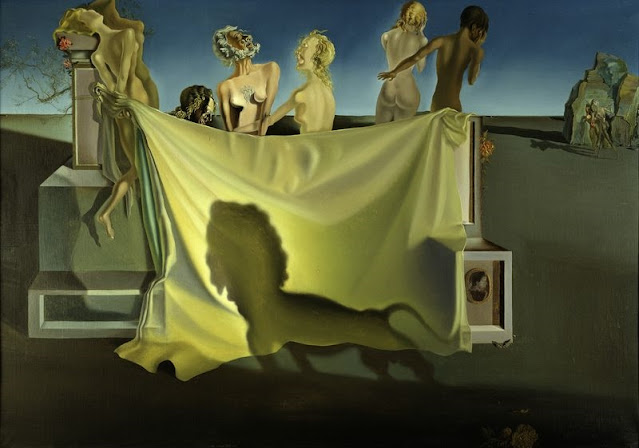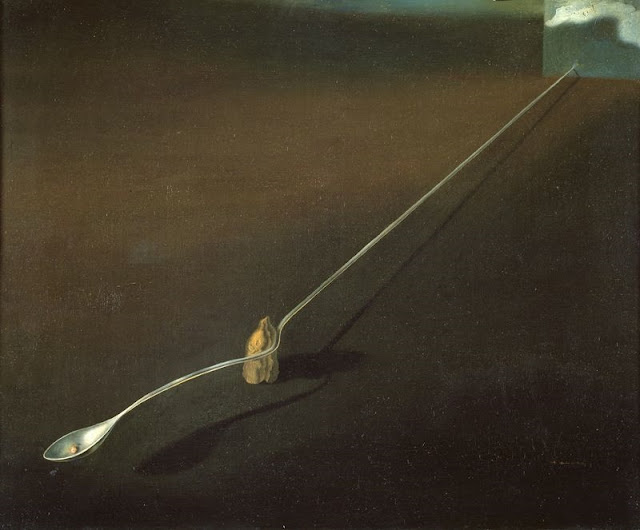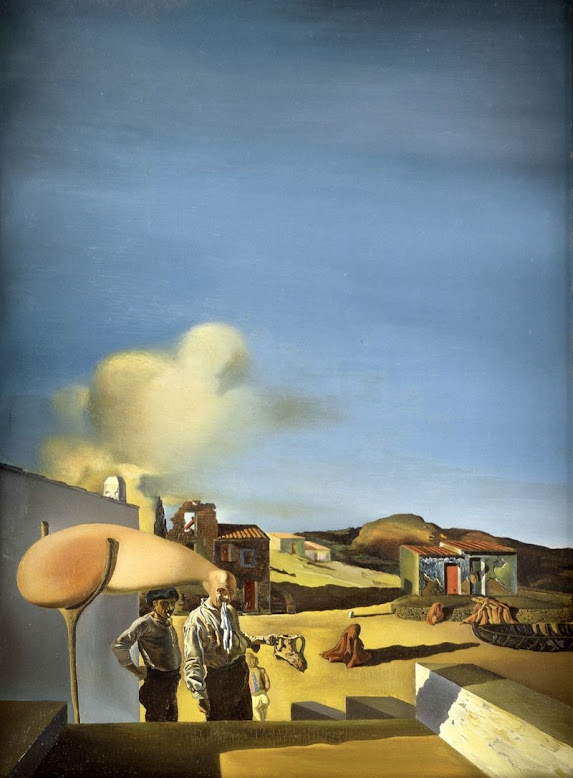Salvador Dalí is among the most versatile and prolific artists of the 20th century and the most famous Surrealist. Though chiefly remembered for his painterly output, in the course of his long career he successfully turned to sculpture, printmaking, fashion, advertising, writing, and, perhaps most famously, filmmaking in his collaborations with Luis Buñuel and Alfred Hitchcock. Dalí was renowned for his flamboyant personality and role of mischievous provocateur as much as for his undeniable technical virtuosity. In his early use of organic morphology, his work bears the stamp of fellow Spaniards Pablo Picasso and Joan Miro. His paintings also evince a fascination for Classical and Renaissance art, clearly visible through his hyper-realistic style and religious symbolism of his later work.
For more biographical details see Part 1, and for earlier works see Parts 1-5 also.
This is part 6 of an 18-part series on the works of Salvador Dali.
All artworks © Salvador Dalí, Fundació Gala-Salvador Dalí, Figueres.
 |
| 1931 Symbiosis of a Head of Sea Shells oil on canvas 35 x 27 cm Private Collection |
 |
| 1931 Sphinx Embedded in the Sand oil on canvas 19 x 26.6 cm Eli and Edythe Broad Art Museum, Michigan State University, East Lansing, MI |
 |
| 1931 Solitude oil on canvas 35.2 x 27.1 cm Wadsworth Atheneum, Hartford, CT |
 |
| 1931 Premature Ossification of a Railway Station oil on canvas 31.5 x 27 cm Private Collection |
 |
| 1931 The Shades of Night Descending oil on canvas 61 x 50 cm The Dali Museum, St. Petersburg, Florida |
 |
| 1931 The Sense of Speed oil on canvas 33 x 24 cm The Gala-Salvador Dalí Foundation, Figueres |
1931 The Persistence of Memory
Perhaps Dali’s most famous painting, was an overnight sensation on its first exhibition in New York, in January 1932. (It had remained unsold when first exhibited in Paris the previous summer.) The gallerist and early champion of the Surrealists Julien Levy proclaimed the painting “10 by 14 inches of Dalí dynamite,” and an image of it was reproduced in nearly every review. Years later, Dalí would recount its genesis, claiming that the “soft watches” had their origin in the remains of a “very strong Camembert” cheese. Rendered with the artist’s meticulous attention to detail, the painting’s three pocket watches hang flaccidly from a denuded tree branch, a ledge, and a bestial form that, on closer examination, resembles Dalí’s own distorted face. As sunlight hits the distant cliffs and glassy water, ants teem on the surface of the single closed watch, and a fly alights nearby—suggesting rot and waste in an otherwise pristine landscape. With its uncanny juxtaposition of the ordinary and the bizarre, and its suggestion of time arrested or out of sync (the watches all point to different numbers), The Persistence of Memory possesses an eerily dreamlike quality. It showcases Dalí’s interest in exploring how the mind interprets reality and the primacy of sexuality to the human psyche—lines of inquiry that would remain constant throughout his career.
 |
| 1931 The Persistence of Memory oil on canvas 24.1 x 33 cm MoMA, New York |
 |
| 1931 The Old Age of William Tell oil on canvas 98 x 140 cm Private Collection |
 |
| 1931 The Feeling of Becoming oil on canvas 35.2 x 27.3 cm The Gala-Salvador Dalí Foundation, Figueres |
 |
| 1931 The Diurnal Illusion oil on canvas 34.5 x 25.4 cm Private Collection |
 |
| 1931 Untitled (Woman Sleeping in a Landscape) oil on canvas 27.2 x 35 cm Peggy Guggenheim Collection, Venice |
 |
| 1931 The Anthropomorphous Echo oil on canvas 36 x 26 cm Private Collection |
 |
| c1931 Masochist ensemble oil on canvas 81 x 100 cm Private Collection |
 |
| 1931-32 Gradiva Rediscovers the Anthropomorphic Ruins oil on canvas 65 x 54 cm Museo Nacional Thyssen-Bornemisza, Madrid |
 |
| 1932 Birth of Liquid Desires oil and collage on canvas 96.1 x 112.3 cm Peggy Guggenheim Collection, Venice |
 |
| 1932 Anthropomorphic Bread oil on canvas 24 x 16.5 cm The Gala-Salvador Dalí Foundation, Figueres |
 |
| 1932 Agnostic symbol oil on canvas 54 x 65.2 cm Philadelphia Museum of Art, PA |
 |
| 1932 Catalan Bread oil on canvas 24 x 33 cm The Dali Museum, St. Petersburg, Florida |
 |
| c1932 Egg on the Plate without the Plate oil on canvas 55 x 46 cm Private Collection |
 |
| 1932 Eggs on the plate oil on canvas 60 x 41.9 cm The Dali Museum, St. Petersburg, Florida |
 |
| 1932 Surrealists Objects, Indicators of Instantaneous Memory oil on canvas 75 x 63 cm Private Collection |
 |
| 1932 Memory of the Child-Woman oil on canvas 99 x 120.6 cm The Dali Museum, St. Petersburg, Florida |
 |
| 1932 Meeting of the Illusion and the Arrested Moment oil on canvas 23 x 15 cm Private Collection |
 |
| 1932 The Angelus oil on wood panel 16 x 21.7 cm Private Collection |
 |
| 1932 William Tell and Gradiva oil on copper 30 x 24 cm The Gala-Salvador Dalí Foundation, Figueres |
 |
| 1932 Untitled (The Veiled Heart) oil on canvas 24 x 16 cm Private Collection |
 |
| 1932 The Real Painting of "The Isle of the Death" by Arnold Böcklin at the Angelus Time oil on canvas 77.5 x 64.5 cm Von der Heydt-Museum, Wuppertal |
 |
| 1932 The nostalgia of the cannibal oil on canvas 47.2 x 47.2 cm Sprengel Museum, Hannover |
 |
| 1932 The Invisible Man oil on canvas 16.5 23.8 cm The Gala-Salvador Dalí Foundation, Figueres |
 |
| 1932 The Birth of Liquid Anguish oil on canvas 55 x 38.5 cm Private Collection, on loan to Hamburger Kunsthalle, Germany |
 |
| c1932-36 The Signal of Anguish oil on wood panel 21.8 x 16.2 cm Scottish National Gallery of Modern Art, Edinburgh |
 |
| c1932 Phosphene of Della Porta oil on canvas 109 x 80 cm Private Collection |
 |
| c1932 Necrophilic Fountain Flowing from a Grand Piano oil on canvas 22 x 27 cm Private Collection |
 |
| c1932 House for Erotomaniac oil on wood panel 14 x 18 cm Private Collection |
 |
| c1932 Egg on the plate without the plate oil on canvas 46 x 46 cm (destroyed) |
 |
| c1932 Ambivalent image oil on canvas 65 x 54 cm André-François Petit collection, Paris |
 |
| c1932 The Fine and Average Invisible Harp oil on canvas 21 x 16 cm Private Collection |
 |
| c1932 The Dream Approaches oil on canvas 61.1 x 54.3 cm The Ulla and Heiner Pietzsch Collection, Berlin |
 |
| c1932 Surrealist Essay oil on canvas 110 x 80 cm The Israel Museum, Jerusalem |
 |
| c1932 Surrealist Architecture oil on wood panel 14.1 x 18.1 cm Kunstmuseum, Bern |
 |
| c1932 Woman and Catalan Bread oil on canvas 16 x 22 cm The Gala-Salvador Dalí Foundation, Figueres |
 |
| c1932 Untitled oil on canvas 66.7 x 47 cm The Dali Museum, St. Petersburg, Florida |
 |
| c1932 The Mysterious Sources of Harmony oil on canvas 54.6 x 45.7 cm Private Collection |
 |
| c1932 The Knight at the Tower oil on wood panel 18 x 13.8 cm Private Collection |
 |
| 1933 The Grasshopper Child (Enfant sauterelle) engraving 37 x 29.7 cm (plate) MoMA, New York |
 |
| 1933 Seascape oil on canvas 61 x 46 cm Private Collection |
 |
| 1933 Portrait of Edward Wassermann oil on canvas on cardboard 39.5 x 30.5 cm The Gala-Salvador Dalí Foundation, Figueres |
 |
| 1933 Millet's Architectonic Angelus oil on canvas 73 x 60 cm Museo Nacional Centro de Arte Reina Sofia, Madrid |
 |
| 1933 (some elements reconstructed 1970) Retrospective Bust of a Woman painted porcelain, bread, corn, feathers, paint on paper, beads, ink stand, sand, and two pens 73.9 x 69.2 x 32 cm MoMA, New York |



No comments:
Post a Comment
Note: only a member of this blog may post a comment.